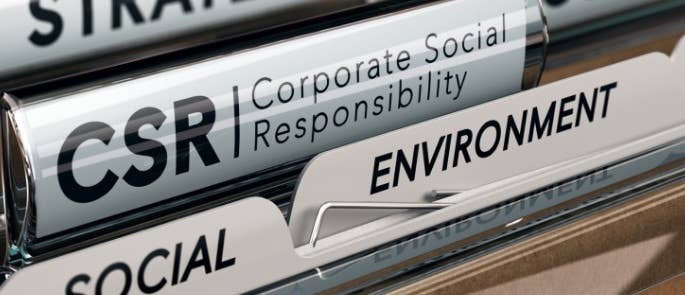What is Greenwashing & CSR in the Hospitality Industry?
Greenwashing. It’s a term you might have heard thrown around in debates surrounding environmental issues and sustainability – but what does it really mean? It’s a tactic used by companies to make people believe that they are doing more to protect the environment than they really are. This relates to the food and drink sector in a number of ways – such as with packaging, ingredients and the transportation of goods.
Corporate Social Responsibility (CSR) refers to the practices businesses can implement to become involved in philanthropic practices to benefit society – in the food and drink industry, this is largely centered around environmental issues.
In this article we will outline what greenwashing means alongside providing examples of it in the industry. We will explain the importance of CSR, and go on to discuss how you can identify greenwashing and quantify environmental goals in your business.

What Does Greenwashing Mean?
Greenwashing is the process of conveying a false impression or providing misleading information about how a company’s products are environmentally friendly. In the context of the food and drink industry, this can range from anything like companies claiming to have eco-friendly packaging, that turn out to be harmful to the environment in some shape or form, or claiming food items are sustainable, when actually they cause damage and harm to the environment.
It is a term used to describe businesses that provide misleading or unsubstantiated claims in regards to their environmental impact. These claims are then used to appeal to consumers’ beliefs in order to be perceived as good. It seems to often be the case that many companies use CSR as a marketing tool and then indulge in greenwashing to make it seem that they are doing more than they are.
Different types of greenwashing can range from marketing claims, misleading labels and ‘green’ images.
Examples of Greenwashing
Greenwashing can sometimes be hard to spot, but if you know what you are looking for and can recognise some examples of it in real life, it will become easier to see. Some examples of greenwashing are:
- McDonald’s paper straw campaign: When McDonalds decided to switch their straws from plastic ones to paper there was nothing short of uproar. Something about a borderline soggy paper straw that had been sitting in someone’s diet coke for a few hours seemed to really rile people up. And all this commotion for a change that wasn’t even as environmentally friendly as once thought. The straws can’t actually be recycled due to the UK’s recycling infrastructure and even if they could be recycled, the cups themselves are not recyclable. Changing straws from plastic to paper did not really solve the problem of single use plastic, it simply acted as a ploy to make McDonalds look greener.
- Oatly milk greenwashing claims: The plant based milk brand, who famously presents itself as being a climate friendly alternative to not only cows milk but other plant-based alternatives has been allegedly misleading investors on its sustainability credentials. They faced backlash when it surfaced that they had received investment from a deforestation-linked investment management company in 2020. It was also claimed that Oatly’s production process generated dangerous volumes of wastewater, to build its own treatment facilities.
- Fiji Water marketing: A common greenwashing tactic is constructing a ‘green’ image around a product that is, in fact, linked to systems of pollution and single use waste. Their branding is largely centered around visually pleasing shots of luscious jungles and branding lines like ‘every drop is green’. However, the company is selling single use plastic bottles and transporting them globally with pollutive transportation. Famously they came under fire for their ‘forward-crediting‘ approach to their carbon negative claims.

Greenwashing is, now more than ever, viewed very negatively. Consumers who are becoming increasingly environmentally conscious are hot on brands and companies that do not meet the standard of eco friendly attitudes and policies. Therefore, it is essential to act on greenwashing claims (though avoiding them entirely in the first place would be a better place to start). Whiffs of greenwashing claims can spread quickly, lose you business and attract negative media attention.
There are many negative consequences of indulging in greenwashing – largely it means you are misleading people into acting unsustainably, the environment suffers, and it diminishes consumer trust. This is especially true for larger companies who have enormous customer bases, and great influence over consumers.

Why is Corporate Social Responsibility Important in the Hospitality Industry?
Corporate Social Responsibility (CSR) is a form of international private business self-regulation, which aims to contribute to societal goals of philanthropic, activist or charitable nature. This is done by engaging in, or supporting ethically oriented practices. This is what many companies aim to engage in, however, for some it simply ends in another case of greenwashing to make them appear more eco-friendly.
CSR is important in hospitality as it encourages organisations to do good within society, and further benefits them from a business point of view – think positive media attention, publicity and societal respect. A win-win if you will. The benefits of CSR policies in a business are far and wide – ranging from societal, economic and environmental. Examples of these are:
Social:
- Engagement with the local community and authorities.
- Good reputation of business, as many consumers are now environmentally conscious.
Economic:
- If an organisation has a good reputation, recruitment and potential investment is often easier.
- Less employee turnover due to a good reputation can decrease the cost of recruitment.
- Workers are more productive working for a company they are proud of.
- Food publicity in the media can result in a rise in profit.
- Reducing waste to make money, through redistribution, not using as much energy or having fewer costs associated with sending waste to landfill.
Environmental:
- Environmentally friendly, with a green ethos.
- Energy saving.
- Waste control.
- Recycling.
CSR is particularly important within hospitality as the industry as it has historically had a rather dramatic impact on the environment through energy and water consumption, food waste and the use of consumable goods – to name a few.
The hotel sector alone currently accounts for around 1% of global carbon emissions, and this is only set to increase as the industry grows. Restaurants also have a huge role to play as food production is the economic sector with the largest impact on biodiversity – contributing 60-70% of total biodiversity loss in terrestrial ecosystems, and a further 50% of loss in freshwater systems.
Check out our article on How to Improve Sustainability in Restaurants.

How Do I Identify and Avoid Greenwashing Claims?
It is important to know what to look out for when identifying and avoiding greenwashing – below we have listed some key signs to look out for:
- Look for verification: When a company makes a claim, look for certifications, facts and figures to back it up.
- Quantifiable goals: Has the company just stated ‘we aim to be more sustainable over the next 5 years’, or have they set a quantifiable goal? For example, planting 100,000 trees or becoming carbon negative by 2030.
- Check who is making the products: Check that a company is also involved within social sustainability. Do they have a parent company which is involved in unsustainable practices?
- ‘Vegan’ when applied to products that aren’t food: Often when a non-food product is referred to as vegan, this usually means synthetic. This is not always a bad thing but can be a cause to dig deeper.
- Look past slogans, colours (usually green) or fluffy and vague language: Throwing words like ‘sustainable’, ‘green’, ‘natural’ and ‘eco-friendly’ around is all well and good, but often these claims are unsubstantiated and are not reflective of the company.
- Look for brands that have more of a green ethos across the whole company, as opposed to just a few areas: If they only sell a handful of eco-friendly products, it is likely they only stock them to catch eco conscious customers, and are not actually making wider changes throughout their organisation.
- Do your research: Dig a little deeper than just surface value and investigate claims made by companies. Has their environmental impact data been cherry picked?
Tips for Businesses on Communicating Environmental Goals
It is important that companies try to avoid greenwashing and instead, communicate their sustainability efforts accurately. There are numerous steps you can take to be open and honest when communicating your environmental goals:
- Ensure that you have data to back up your claims.
- Have a third-party expert evaluate your sustainability measures.
- Make information on your website clear and straightforward.
- Detail any green business certifications you have so consumers can learn more.
- Use minimal packaging or eco friendly packaging where possible.
Remember to employ a metric and measuring system to track your progress. This way, your company can keep a record of potential mistakes and improve future efforts. There needs to be a method to hold yourself accountable, and to have data you can present to customers. There is a need for companies to quantify environmental goals instead of simply writing claims such as ‘we are committed to sourcing sustainably’, which means nothing as it is not a measurable goal.
SMART Goals
Set SMART goals in relation to communicating your environmental aims, this way consumers and those within the business can see what you are doing to achieve success, how you are doing it and when. SMART goals are:
- Specific: Your goals must be clear and defined – this comes back to not claiming fluffy, and generic statements that are hard to understand or vague. Keep your customers in the loop with clear and specific goals.
- Measurable: You should be able to measure your goals throughout and at the end of the process. This is how you will see and be able to present to consumers that you have improved or achieved your goals.
- Attainable: Again, it is important to set goals that are actually achievable, so that you will be having a positive impact on the environment – as opposed to staying the same but luring in customers under false accusations of being ‘greener’.
- Relevant: Set relevant goals in the direction that you are wanting to take your company in, and ones that align with your brand values.
- Time Bound: Your goals must have a deadline. Set a time frame in which you would aim to have it completed – this way consumers can keep track of your efforts, and will know when to expect the change.
Environmental Performance Indicators (EPI’s) are used to measure the success of a project’s progress and/or success in relation to environmental issues such as pollution, biodiversity and climate impact. EPI’s should indicate whether the state of the environment has changed positively or negatively and they should provide a measure of that change. They are used in measures of avoiding greenwashing as companies can meaningfully track dedicated processes in becoming more environmentally conscious and ‘green’.

The hospitality industry depends on a healthy global ecosystem and is uniquely vulnerable to environmental damage. Climate change and biodiversity loss are two major interconnected environmental issues that have a broad impact on tourism, and consequently, the hospitality industry. Hotels on the US coast are predicting flooding, and restaurants are contemplating a mass fish extinction. Animals and the ecosystems in which they live are a major reason for travelling, contributing to an estimated 20 – 40% of the global tourism industry.
It is clear to see that protecting the environment acts as a benefit for both the planet and the hospitality industry – they work hand in hand. Therefore, engaging in CSR with the right reasons and measurements, and avoiding any cases of greenwashing is essential not only for business, but also for consumers and the world we live in.
We hope you found this article helpful, and that you can take this information on board and put it into practice when implementing CSR into your business and looking out for, and avoiding greenwashing. For any more information feel free to get in touch. High Speed Training offers a wide variety of courses and resources that can help.
Further Resources:
- Sustainable Food Practices: Choices & Importance
- What are the Different Types of Sustainable Food Packaging?
- 17 Ways to Reduce Food Waste in Your Restaurant
- Recycling in the Hospitality Industry: How & Why Should We Do it?
- How to Implement Corporate Social Responsibility in Your Small Business
- What is Healthwashing in the Food Manufacturing Industry?





